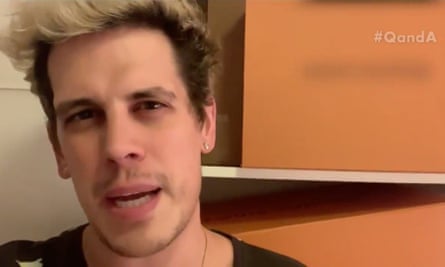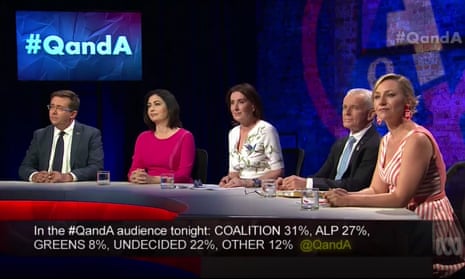Tony Abbott once banned his ministers from appearing on Q&A, arguing the ABC Monday night forum hosted by Tony Jones since 2008 was “out of control” and a “lefty lynch mob”.
It was at the height of the row over former terrorism suspect Zaky Mallah asking Coalition MP Steve Ciobo a question. News Corp publications railed against the show, even photoshopping an ABC logo onto an Isis flag. The Australian editorialised that Q&A was focused on “green-left issues” and was “always stacked” in favour of the left.
But critics of Q&A don’t always come from the conservative side of politics.
On Twitter, Q&A has a dedicated group of people who call it “The Bad Show” and refuse to watch. They say it is trivial, populist and gives a platform to people who are divisive and ill-informed. The public broadcaster with a remit to inform and entertain should do better, they argue.
Yes I have a question. What chance is there for useful, informative debate with him on the panel. #qanda degrades itself with this clickbait nonsense. It's more like dumb reality TV rather than intelligent discussion. You do the public a disservice. The bad show
— choosing (@ch150ch) April 12, 2019
Despite its high profile, and the number of news stories and recaps it generates each week, Q&A has a relatively small metro audience of between 350,000 and 400,000.
Generally Four Corners and Media Watch, which precede it, attract a higher audience. As audiences for free-to-air television have declined so has Q&A – in its heyday it attracted an audience of around 700,000 people. But the ABC says high ratings are not the aim as the core obligation is to generate public engagement.
Q&A almost doubled its audience to 666,000 when Malcolm Turnbull was the sole guest last November, and a recent episode with Canadian psychologist Jordan Peterson attracted 429,000 in the five capital cities which are measured by OzTAM.
One of its critics is author Tim Dunlop who says he doesn’t like Q&A because the conflict is structurally built in.
“It really doesn’t fulfil its brief of being an informative, useful, contribution to public debate,” Dunlop tells Guardian Australia.
“It’s predicated on getting as extreme views as they can on the show rather than informed views and letting people go at it.
“The argument always seems to be the people are elected or they are important in some way to the conversation. But if you watch the show it undermines their argument because the host has to constantly intervene.”
Veteran executive producer, Peter McEvoy, a multiple Walkley award-winning journalist who has been at the helm of Q&A from the start, defended the inclusion of One Nation candidate Malcolm Roberts last week along these lines, and was backed up by fill-in host Virginia Trioli.
The last time Roberts appeared on Q&A his exchange with astrophysicist Brian Cox about climate change was deemed a national embarrassment as he threw conspiracy theories at the eminent professor.
When Q&A announced he was coming back, many questioned why, and said it was a blow to ABC news’s credibility because of his views on climate change.
“If you are going to have a panel in Queensland during an election campaign then you have to have the top four parties that have the greatest chance of getting elected representatives there,” Trioli told ABC radio in Brisbane before the broadcast.
“And that includes One Nation. Now those who don’t like One Nation are perfectly entitled to not want One Nation to be in the discussion.”
But it took all of Trioli’s considerable wrangling skills to manage the outbursts from Roberts, and an even more badly behaved Coalition senator James McGrath, who was hectoring and aggressive.
“Virginia Trioli did a good job but most of the time she was cutting off Malcolm Roberts and bringing him back to the topic, which completely undermines her own argument about how valuable these type of guests are,” Dunlop says.
“If you’ve got, as a host, to act like that because of the guest you’ve bought on then how do you justify having him on in the first place?”
Other accuse Q&A of inviting right-wingers on to appease News Corp, or even to court controversy. The production team reject this outright, saying they balance the panel and audience to represent all views and abide by the ABC editorial policies. “If we wanted to court controversy we’d have Blair Cottrell on,” one producer says.
McEvoy says he doesn’t invite people on the show to appease political factions or to court controversy.
“There’s enormous pressure on Q&A from politicians, advocates, commentators and social media users all wanting their own opinions to be give favoured treatment,” he says. “We resist that pressure without fear or favour.”
A special Mackay edition of the program in August last year sparked criticism for featuring three rightwing politicians to one Labor MP, Cathy O’Toole, and a former Greens senator: Bob Katter, Pauline Hanson and George Christensen.
A tweet published before the show listed “white Australia” as a possible topic of discussion.
White Australia is not a topic to me. It's a horrid reminder of childhood. I can't stomach this tonight. pic.twitter.com/HwkR3g1lLU
— Kumi Taguchi | 田口久実 (@kumitaguchi) August 27, 2018
McEvoy says the five panelists were “literally representatives of Queensland in the Australian parliament. They don’t speak for everyone but they have the right to be heard.
“Questioning politicians and contenders is at the core of what Q&A does,” McEvoy says. “James McGrath and Terri Butler represent Queensland electorates while Larissa Waters and Malcolm Roberts are strong contenders for election to Senate.”
In February the program was again under fire for airing a video question from the British far-right activist Milo Yiannopoulos to guest Jordan Peterson. Again, some viewers questioned why the far-right agitator was given a platform. Many wondered why Peterson himself was on.

The Australian government cancelled Yiannopoulos’s visa to visit Australia just weeks after the show aired, following comments he made after the Christchurch massacre.
When Q&A called for questions for Roberts there were more than 1,200 responses, and most of them questioned the program’s decision to invite the Senate candidate on in the first place.
Malcolm Roberts became well known for his denial of climate change when he was last in the Senate. | @ConversationEDU #QandA Do you have a question?https://t.co/fUUgQPnR8T
— ABC Q&A (@QandA) April 11, 2019
It was the “final nail in the coffin of that program’s credibility as a forum for informed debate & discussion,” one person said.
Trioli explains that the production team had consulted ABC election analyst Antony Green before the latest polls and he said Roberts would in all likelihood end up being a senator again.
“So in order to have a representative panel of the federal political situation in Queensland you need to have One Nation,” she says.
The @QandA youtube channel has given its Jordan Peterson clips spammy, algorithm-attracting titles.
— Ketan Joshi (@KetanJ0) March 1, 2019
Should successfully radicalise a bunch of 13 year old boys into hating women. Great work. pic.twitter.com/tocQPF2UlV
Dunlop rejects Trioli’s argument, saying inviting people such as McGrath and Roberts on reinforces the notion that public debate is “people screaming at each other”.
“It’s irrelevant that they’re elected,” he says. “They’re still uninformed.”
Hey Twitter. You’re getting all SHOUTY again. We share and quote a very wide range of opinions. We don’t endorse the opinions, we just make them available to encourage public discussion. That’s the #QandA project. Guess it’s working.
— ABC Q&A (@QandA) April 5, 2019
McEvoy says it is not irrelevant. “Q&A includes elected politicians because they make the decisions that impact on Australian lives,” he says. “Q&A isn’t designed to generate an academic conversation; Q&A is designed to give citizens a chance to interrogate the powerful.”
The program’s social media team has further fuelled its critics by tweeting links to News Corp articles which are critical of Labor, and by giving YouTube videos titles such as “Jordan Peterson Destroys Q&A” which echo Peterson’s own channel.
The departure of Jones at the end of the year has triggered a race for a replacement, with Trioli, the current co-host of ABC News breakfast, a front runner.
